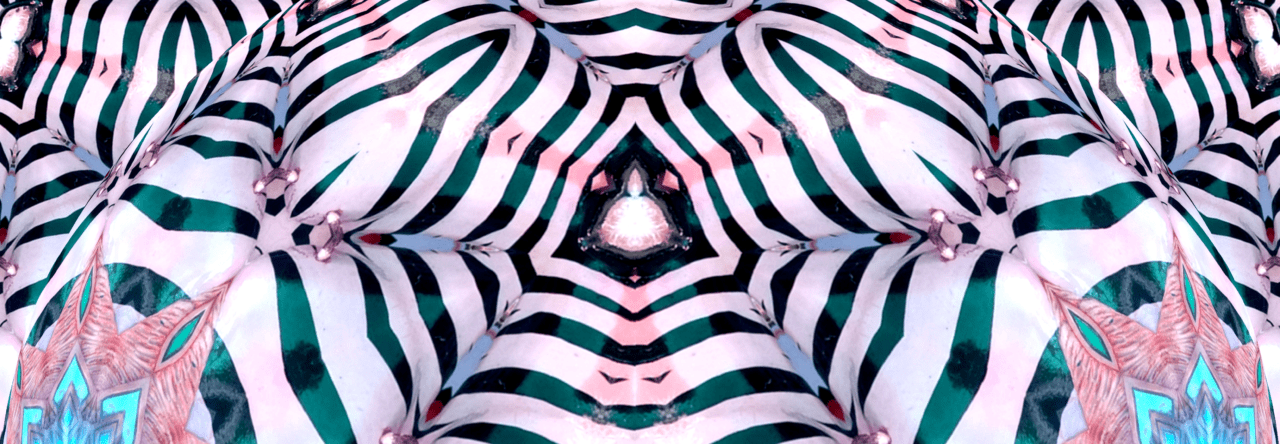Month: November 2017
It was in the year 2000 that I began my first of several shamanic apprenticeships in the Toltec Eagle Night Lineage of don Miguel Ruiz, author of the iconic The Four Agreements. Now, nearly 18 years later, those four little agreements mean as much if not more than ever. They have proven to be much more than the words that comprise them; they are little packets of deep wisdom that have continued to unfold and reveal themselves over the years.
 While I was on my yoga teacher training in October of 2017, I realized that these four agreements have a place in my yoga practice, too. I present them here, not necessarily in the order originally presented!
While I was on my yoga teacher training in October of 2017, I realized that these four agreements have a place in my yoga practice, too. I present them here, not necessarily in the order originally presented!
Don’t Make Assumptions
As we practice, it is crucial that we neither make assumptions about what yoga is and isn’t nor what our body can and cannot do. In regards to the latter, it will always be different from day to day (see the 3rd agreement!). And in regards to the former, well, there are plenty of misconceptions about yoga in the Western world. It isn’t just some exercise program, though many have reduced it to such. Yoga is an ancient and holistic wellness system that engages the mind, body and spirit. When we take the reductionist view and turn it into a good workout, we completely miss the gems that yoga is meant to provide a life. If we’re teachers, we perpetuate this misunderstanding in a world that is desperate for the deeper gifts yoga offers.
This also applies to how we approach a pose. If we have some construct in our heads of how, say, Trikasana looks, we might take our body there with our mind and fail to feel the actual journey that the body takes there. This is a surefire way to be injured. Instead, we should come to a pose as if for the first time each time, taking our time and listening deeply to the body.
When we make assumptions, be they about yoga or meditation or someone’s motivation for doing something, there’s a pretty good chance we’re going to get it wrong, either putting ourselves in a box, putting someone else in a box, or just creating a lot of unnecessary drama.
Don’t Take Things Personally
Yoga has become a bit of a competitive sport, if not openly so, inside the heads of those taking classes. We see our neighbor doing a perfect wheel and we take it as a sign that there is something lacking in us. We watch the skinny ballet-like figure in the picture and compare our bulging selves. We do more than we should to save face and wind up with a pulled muscle.
There is nothing personal in having the body you were born with. Yes, it’s yours…for now. But what it looks like and moves like isn’t about you. It’s structure has been deemed perfect for you in this lifetime by something far more intelligent than the personal mind. If you have an injury or disability, it is not a punishment. But it is something to embrace and accept. Yoga is above all learning to accept ourselves. Sure, the Western culture tells us to work for the body we want, but yoga tells us to work with the body we’ve got.
When we take things personally, we believe they somehow identify us. We are overly enamored with the image and out of contact with reality.
Always Do Your Best
This agreement ties into the one above fairly seamlessly, but from another perspective. This is perhaps the most misunderstood of all the agreements because the mind’s idea of “best” often has nothing to do with our true capabilities, instead being a composite of the voices of parents, teachers, and peers that we somehow internalized to keep ourselves safe. We often conceive of “best” by comparing ourselves to others or by gauging our abilities according to some unrealistic expectation.
Our best will look nothing like another’s, and it may change day to day. It will be impacted by how tired or stressed or hungry we are. This agreement is perhaps one of the most important to our yoga practice because, if taken in the right way, it reminds us that gripping and striving have nothing to do with yoga while it also reminds us that sometimes, the high road is a more challenging road, but it is still the one to take. And finally, if we do slip up or behave in a way that is out of alignment with our principles, this agreement reminds us that we’ve made the agreement to do our best, so there is no need to judge ourselves for messing up! We did our best!
So do your best. Not less. But definitely don’t set yourself up to fail with unreasonable expectations either. It is just as bad to grip and strive and force as it is to collapse and give up. This agreement points to the Buddha’s Middle Way…free from extremes.
Be Impeccable with Your Word
This applies to the promises we make ourselves and to the way we speak about and to ourselves. If we say we are going to practice daily for at least 1/2 an hour, then we should honor that. If we aren’t, we should investigate why we aren’t living up to our word. This is also about not using the word against yourself. Thoughts or outward expressions of “not being good enough”, being “too fat or too clumsy”, or falling short in any way is not only a terrible way to treat yourself, it’s a surefire way of creating self-fulfilling prophecies.
This agreement has a particular importance for those of us teaching yoga. If we’re giving too many or meaningless cues or worse, cues that have no basis in our own felt sense, we are out of alignment with our yoga. That isn’t to say we can’t be metaphorical or poetic. But is what we are saying rooted in both our experience and our knowledge?
We also have to be careful about making something “wrong”. Just because a certain approach or technique or cue doesn’t work for us, that doesn’t mean it won’t be better for a student. Rather than taking it on ourselves to make those kinds of decisions, we need to offer options and modifications to our students, helping them to increase their ability to perceive their own bodies, sensations and feelings so they can intuit what’s best for them.
Be Skeptical, but Listen
This 5th Agreement, added some years after The Four Agreements was published, reinforces that curiosity is a critical attitude to cultivate in yoga. When we remain curious, the body is free to discover its own path. This agreement reminds us that WE are the guru. So as we are listening to a teacher in a yoga class, we remember to listen and share in the group experience of whatever pose is demonstrated, but also to be skeptical.
Does the way a posture is being shown make sense to your body? Is your body sending you signals that it is too much or not enough, or that it is having to grip or resist? And even then, be skeptical. Is it your mind that is telling you your body can’t do another repetition of something? Perhaps you are stronger than you think?
Our curiosity keeps us open, free to explore and draw our own conclusions. Yoga isn’t about putting your body into a pose. It is about finding what the pose might be for your body.
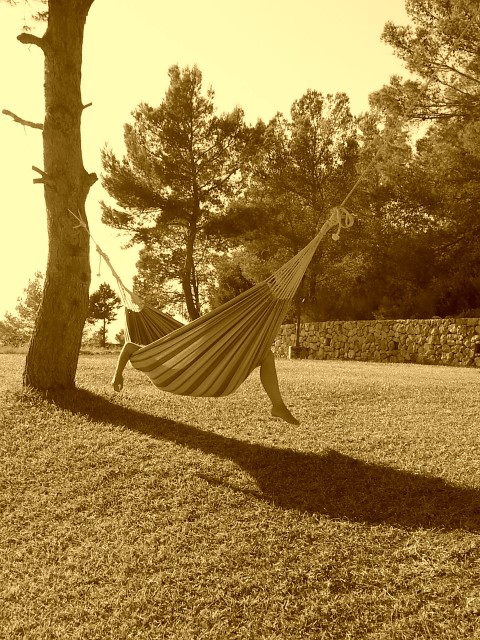
An INTROVERT in an EXTROVERTED WORLD
There were many lessons learned while on Yoga Teacher Training (YTT) for 30 days in Ibiza, Spain. I’ve written about some of them already (Part I and Part II). Today, I’d like to share my 3rd big lesson which was perhaps the most personal…and lengthy. Bear with me…
I mentioned in one of the earlier posts that one of the greatest challenges was sharing close quarters with a group of strangers. We were, for the most part, a house of “odd couples”, and there were times when irritations and annoyances were magnified. I should also mention that despite this, we all got along very well…considering.
Still, I found it hard to find my comfort zone among so many people. I am not only a highly sensitive person but also a full-blown introvert. Finding space, downtime, and freedom from stimulation was a bit of a challenge. There were expectations for us to engage socially, which was fine; I wanted to get to know people. But I was often faced with a choice. I need a lot less engagement than others. I like being alone. I need it to feel centered. So would I take care of myself and my needs and risk feeling isolated or would I fit into “other people’s rhythms” and meet the social expectation?
I am early to bed, early to rise by nature. The majority, however, enjoyed their late nights and weekend sleep-ins. Because dinner was served often after 8PM, I took to setting aside leftovers so I could eat my dinner as soon as classes were finished, giving me time to digest. That meant that I missed out on many dinner conversations and connections. Instead, I’d be in my room journaling, meditating, or listening to music before bed. When we had breaks, I’d often just want to go off alone on hikes or hang out by myself. And even though we had opportunities on the weekend, I didn’t really want to site-see. To me, it felt like a distraction from my focus. While I wouldn’t have minded getting off the top of that hill for a couple of hours, given the choice of relying on someone with a car and having to be out all day (or night) long, or being stuck at the house, I happily chose “stuck at the house” where I could recharge.
Most introverts sense the judgment that comes with being different, how extroverts might take it as a form of rejection, that we’re “too good for them” or “standoffish”. It creates a vicious circle as each “type” tries to establish their traits as normal or acceptable; it’s a form of self defense. (Of course, we live in an extroverted world, so I would argue that introverts have it harder.) Regardless, their is awkwardness on both sides, struggling to understand one another, and it all makes it that much harder to connect when we want to. I feared I was giving this kind of message in keeping my distance, so I had to overcome this fear of being perceived as judging as well as of being judged.
As an introvert, I actually genuinely like people, very much, but I like them in much smaller doses than the average person. In truth, my system simply needs more down time. While the extrovert enjoys talking, I get overwhelmed by the stream of words. While the extrovert feels energized by interaction. I, on the other hand, just wind up feeling drained and disturbed by the various vibratory fields of others. If there are conversations going and music playing all at the same time, it is simply too much for my nervous system. After a time, it brings on physical pain. My charge comes from time alone and in peace and quiet.
Within the first few days, I became aware that others were engaging with one another in a way that they weren’t with me. It wasn’t something intentional on their parts. I figured they must have been unsure about me, maybe even afraid to interact because they had yet to get a sense of who I was. Or maybe they just thought that I was “the person who didn’t want to engage”…a typical box every introvert knows. So that night, I made the effort to stay up late and engage in more conversation than I normally would. It was worth it. It broke the ice. And thereafter, even though I lived as I needed to, I felt like it was okay.
I spoke with my sister, another introvert, about this today. She brought up an important point…that introversion is often considered some kind of pathology. But there’s nothing wrong with us. We’re just different. We don’t need fixing. We don’t need pity. We simply need more space and a healthy dose of respect and understanding.
Regardless of where we fall on the extroversion/introversion spectrum, we’ve each got our stuff. The only thing we really need to deal with is our stuff. It’s so much easier than trying to deal with everyone else’s…or expecting others to deal with ours for us. Why should they? Sure, there will be misunderstandings and projections. So flippin’ what? Those will always be there until we become the sparkling-clean mirrors for each other that we were meant to be. And this will only happen if we each accept and deal with our own stuff!
Maybe it’s because I was finally able to release any last remnants of self-judgment over my introversion that any outside reflection of being judged was vaporized. I was able to deeply honor and accept my introversion on this journey, and I was fortunate enough to be with a group of people who were okay with that, if not at first, at least in the end.
So in summary, here is my third life lesson from YTT: I’m okay. You’re okay. We’re okay. Even when we’re not okay, it’s still okay. We only have to take what’s ours when it’s not okay. Okay?
We Never Have All the Information
One learns a lot of things at Yoga Teacher Training (YTT): asanas and yogic principles, anatomy, and sequencing, for example. It’s intensive in itself. Add to it tight quarters with strangers, lots of time for inner reflection, and heightened sensitivity and it all results in other lessons too, insights into the self or into life. Last time, I wrote about my mystical experience with a soap bubble, a lesson of our insubstantial nature. In this post, I’ll share another big lesson learned on my recent YTT experience in Ibiza, Spain.
In short: we never have all the information or all the pieces of the puzzle. It’s the nature of duality. Yet we are fabulous (and hell-bent) at generating meaning and judgments around very the sparse information we do have, convincing ourselves that what we’ve generated is absolute reality. In fact, though, details are always missing.
Our entire lives, if we don’t wake up to this realization, we are constructing confining and very often inaccurate boxes to place ourselves, our situations, our solutions and other people into. We leave little room for miracles, let alone facts. But the facts that might be outside of our perception might be enough to completely and irrevocably destroy those seemingly safe little boxes that give us the false sense that we’ve got it all figured out.
It all comes down to protecting ourselves. We are afraid of being neglected or disappointed, rejected or just plain wrong. This is the energy that lies at the heart of the need to draw conclusions, however erroneous.
Cases in point:
During YTT, I had volunteered to make breakfast one Saturday morning which historically consisted of oatmeal. Yet, after searching every drawer and cabinet, I could not find any oats. My mind, afraid of being accused of neglecting to provide what was expected, turned on those who were supposed to provide the goods in the first place! I went about preparing what remained…eggs, fruit, yogurt, granola, cheese, avocado, bread and tomato. I made my apologies, “There were no oats!” It wasn’t until later that day that I was in the kitchen when the damn bag of oats stared me right in the face. It had been on the counter all along. Seriously. Right in from of my face! Yet I had gone on a very long journey in my head which was based entirely on them not being there.
On another weekend, the house ran out of bottled water. Several of us emailed the facilitators to let them know. We waited…and waited. More emails were sent. We waited some more. The conversations that occurred around this were interesting. In my own mind, I began to question the amount of concern and care our facilitators had for our well-being. Having had an earlier interaction with them over water, I was holding that opinion as loosely as I could.
The water came eventually, along with someone who had just arrived that day at the airport. You see, it turns out, the facilitator that eventually brought the water had to pick someone up. She had other responsibilities. This is what delayed her. On the way, they stopped for water and couldn’t find any big bottles anywhere. They ended up getting small bottles. So, the effort was there all along. The concern and care was there all along too. But there were extenuating circumstances of which most of us were unaware. We didn’t know what we didn’t know, and so there was nothing to stop us from expressing our grumps. But how often do we grump with pieces of the greater puzzle missing? How often do we seek out validation from friends and loved ones that we are justified in our thinking about something? How often to we lack insight into situations pr motivations, past histories, and personal challenges of those we judge?
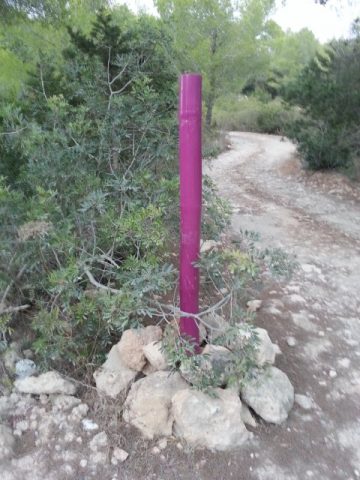 In another example, when I arrived at the house on the first evening, I was in a shared cab. We were told to look for a pink rock and turn there. What we eventually came across was a pink post on the left side of the drive that I could barely see in the dark from out the right side of the taxi. I couldn’t help thinking to myself, “That’s not a rock!” I took a photo of the post to show my partner just how “ridiculous” our directions were. It wasn’t until nearly three weeks later on a walk up the road that I could finally see the “pink rock” on the right side of the road. There it was…and had been, invisible to me from the right side of the cab. I admit, I formed judgments about the directions we were given while lacking this broader realization!
In another example, when I arrived at the house on the first evening, I was in a shared cab. We were told to look for a pink rock and turn there. What we eventually came across was a pink post on the left side of the drive that I could barely see in the dark from out the right side of the taxi. I couldn’t help thinking to myself, “That’s not a rock!” I took a photo of the post to show my partner just how “ridiculous” our directions were. It wasn’t until nearly three weeks later on a walk up the road that I could finally see the “pink rock” on the right side of the road. There it was…and had been, invisible to me from the right side of the cab. I admit, I formed judgments about the directions we were given while lacking this broader realization!
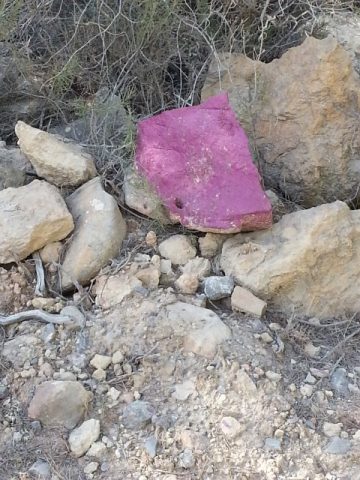
So three weeks later, I took a photo of the rock to remind myself of how ridiculous I can be! Now I have two photos that tell a story and remind me of this very important truth:
We are always missing information.
Always. The universe is that big and that complex. And no matter how much we want to make ourselves feel safe, secure, and like we’ve got it all sewn up, we don’t, won’t and can’t possibly.
Really, accepting this makes life so much easier. It becomes just plain silly, not to mention counterproductive, to jump to conclusions.
LOL – I just remembered a song by Annette Funicello about not jumping to conclusions, a throw-back to age 10 or so. The universe has been trying to teach me this one for a very, very long time! A shame I spent over 15 years of my life thinking I understood the 2nd Agreement of The 4 Agreements by don Miguel Ruiz: Don’t Make Assumptions. It’s clearer now. So, I’m a little slow!
If we can hold everything more lightly, our opinions, judgments, explanations and seeming realities for why things are the way they are, we might actually get an insight or two into actual reality! We give ourselves so much more space to breath, to receive more of that missing information (or not), and just maybe to receive a miracle or two.
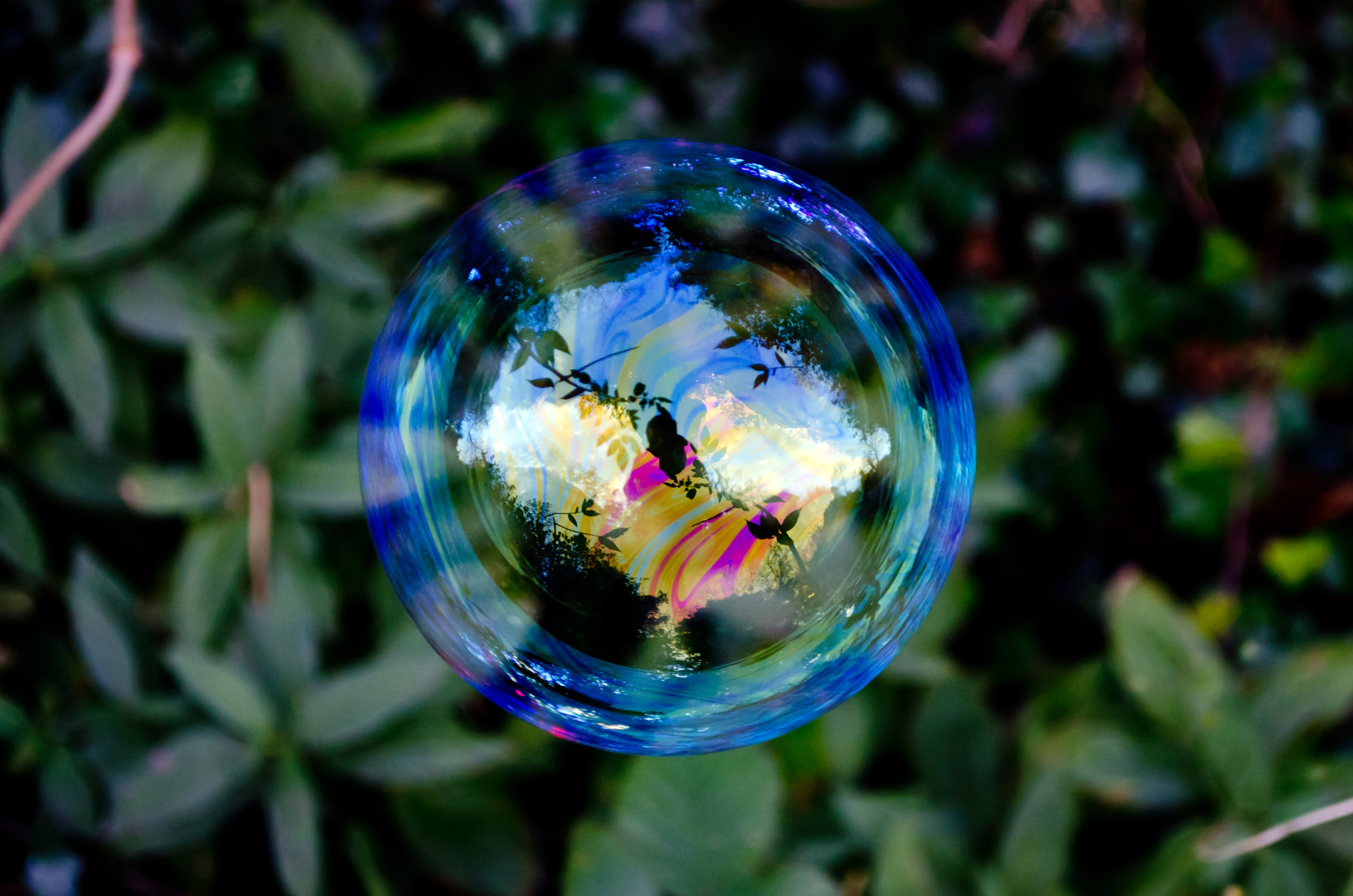
Our Insubstantial Nature
This October, I spent a month in Ibiza, Spain doing something I’ve thought about doing for at least half of my life. I took a 30-day yoga and mindfulness teacher training with Still Flowing Yoga. In my next several blog posts, I intend to write about the three most significant lessons I learned there. I’ll start with the most mystical of them today.
Living in a house with a dozen or so people I never met was perhaps my greatest challenge…that and being stuck on top a mountain for 30 days with no where to run. I was often challenged by the noise, energies, lack of space, and differences in priorities.
One day, when I was about to be particularly challenged later in the day, I was sitting on the couch next to the yoga shala . The house was mostly quiet at that moment. I don’t remember if I was reading a book or on my computer. Something caught my eye over to my left. It was a soap bubble….out of nowhere. One single bubble that popped into existence in the middle of the shala. I looked at the kitchen, wondering if someone was washing up. Perhaps a bubble had escaped the sink…even though that would have been quite a stretch. But no. There were two people in the kitchen, but the sink was idle. Besides, the kitchen was fairly contained and quite a distance from the point of origin of this bubble, a iridescent circle no bigger than 2 cm.
It rose, dancing slowly, and floated toward a window. I thought to myself, half jokingly, “If this is a being with a message, come toward me.” At that point, the bubble abruptly changed direction (seriously!) and floated directly toward me, like Glinda the Good Witch. It took its time, passing right before my face as I leaned back out of its way, touched the pillow at the opposite end of the couch, and poof! I was stunned and delighted. But I had no idea what it all meant.
It wasn’t until several hours later that the full message came through. I was having “a moment”, grappling with age-old disappointment that had arisen as a result of a let down about something which seemed so important at the time. In the height of my inner tantrum, I realized that people are like bubbles. They pop into existence, into our living dreams, and just as quickly pop out again.
All the people who have ever disappointed me in life, where are they now? Yet that sense of disappointment that I’ve carried all these years, why does that remain? Is that as insubstantial as the people who brought it? Yes! Yes! At least it can be.
Everything is temporary and not nearly as solid, enduring, ego-challenging, and humor-stealingly serious as we make it out to be. Nothing.
And then I realized the greater lesson…I too, or who I believe myself to be, am nothing more than a bubble. I have popped into this existence to live the dream of Dielle, and one day, I will pop out again. Poof!
And I pop in and out of other people’s dreams too, just as they do in mine. I will bring some of them pleasure and some of them pain. I very often have no say in the matter, so maybe the bubbles I encounter in my own dream don’t always either. Maybe it is I who project meaning onto their mirror-like surface and vice-versa. Some mirrors are clear reflections and others may be a bit more distorted, but that’s all part of the fun house of life.
So rather than sweat the endless stream of passing events that happen and wish life’s lessons were somehow easier, better to enjoy and savor each little moment, be it fabulous or fuckery. Better to live in awe that bubbles appear at all to teach us our lessons, seemingly from out of nowhere.
We are bubbles, insubstantial little floating orbs that catch the light, but only for a time. We float and cross paths, sometimes lingering, sometimes moving on quite quickly. In the blink of an eye, we can be gone from one another’s dreams. Cherish the miracle of who shows up, no matter who and no matter what they’ve come to say or share. They’ll be gone soon enough.
To all the shining orbs I met in Ibiza, thank you for popping in and out of my dream to say hello and for the magical, mirrored surfaces only you could bring.

